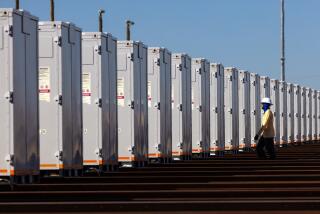Green jobs in state getting little stimulus help
What was once the bustling Evergreen Pulp mill is today a forlorn factory of smokestacks and tan buildings clustered quietly beside the still, gray waters of the Arcata harbor near Eureka, Calif.
Entrepreneur Bob Simpson bought the closed facility in February with the hopes of reopening it as a environmentally friendly toilet paper plant. He planned to spend $400 million rehabbing the factory and rehiring 215 workers who lost their jobs when the old pulp mill shut down in October 2008.
The project stalled after Simpson failed to make his way through the red tape required to access federal stimulus money, billions of which was aimed at promoting energy efficiency and clean technology. Simpson said the government missed out on an opportunity to create so-called green jobs in an economically devastated area of California.
“Our president . . . stated we need to stimulate our economy with green jobs,” he said. “Well, here we are, we’re ready to go.”
Many economists had predicted that California would be a major beneficiary of government stimulus funding in battery technology, wind power and solar energy, with the Golden State reaping a bumper crop of green jobs. A recent report by the federal government said California led the nation with 110,000 total jobs created or saved by the $787-billion American Recovery and Reinvestment Act that Congress signed into law in February.
But so far, few of those positions appear to have anything to do with renewable energy or clean technology, which the Obama administration has touted as key growth industries for the U.S. economy.
Some of that delay was to be expected. The stimulus package gave priority to so-called shovel-ready projects to maximize job creation. The result is that much of the employment created has been in conventional infrastructure projects such as road construction.
Then there are administrative delays. Funds can take months to be funneled through various levels of bureaucracy. The real effect will probably be seen in the first quarter of 2010, as projects move from the planning stage to implementation, said Richard Little, director of USC’s Keston Institute for Public Finance and Infrastructure Policy.
In addition, a good chunk of the funding flowing to green industries is for research, which could prove to be immensely valuable over time but will do little to boost employment in the short term.
Battery maker Envia Systems Inc., which makes lithium battery materials for use in electric cars, applied for two stimulus grants -- one to build a 100,000-square-foot manufacturing facility, the other to conduct research to design a higher-energy-density lithium battery.
The Hayward, Calif., company was awarded $4 million in research funding, co-founder Mike Sinkula said. But its request for money to underwrite the factory was denied.
“It creates some jobs now -- but less jobs than our manufacturing facility would have,” he said.
Then there’s the skill gap. Most of California’s 2.2 million jobless workers aren’t qualified to design new batteries or improve the efficiency of wind turbines.
“There’s a mismatch between skills and experience,” said Ian Kim, director of the Green Collar Jobs Campaign at the Oakland-based Ella Baker Center for Human Rights. “Those hardest hit by the economic crisis may be last in line.”
Some of the lower-skill positions being created with stimulus money are short-term in nature. California received $185 million for a weatherization assistance program through the stimulus bill, and $226 million for energy efficiency grants, Kim said. That money will help put some unemployed construction laborers back to work.
But the jobs are likely to be temporary without continued funding.
There have been some wins for California. In September, the federal government announced a $535-million loan guarantee for Solyndra Inc. in Fremont. The company, which manufactures solar photovoltaic panels, will use the money to build a facility that will create 3,000 construction jobs and 1,000 permanent jobs.
Still, employment figures shouldn’t be the sole benchmark for success, said Peter Fiske, vice president for business development at Pax Streamline in Novato. It received a $3-million grant from the Department of Energy to research circulation control in high-efficiency wind turbines. Employment generated by the grant is minimal -- only two positions. But the effect could be huge, he said. “The larger issue is what is at the core of U.S. competitiveness,” he said. “It’s about innovation and taking U.S. technology to the marketplace.”
But in California, where the jobless rate hit 12.5% in October, job growth remains a major concern.
In Arcata, half the workers at the Evergreen Pulp Mill have yet to find work since the plant’s Chinese owners closed the facility. Simpson bought it in February with the idea of turning it into the first chlorine-free, dioxin-free toilet paper mill in North America.
He says it was the kind of shovel-ready project the government said it was seeking. He had a business plan and support and was ready to begin, as soon as he found a $400-million loan.
Rep. Mike Thompson (D-St. Helena) wrote a letter to the Energy Department on behalf of the company, Freshwater Tissue Co. Civic and environmental leaders, including Gregg Gold, the chairman of the North Group of the Sierra Club’s Redwood Chapter, and Art Harwood, the executive director of the Redwood Forest Foundation, stumped for the project as well.
But Simpson failed to submit the nonrefundable $50,000 fee required to apply for a stimulus loan. He said it was because he couldn’t get anyone at the Energy Department to clarify whether his project would qualify since it didn’t fit neatly into established categories such as wind power or solar energy.
Some of Evergreen’s former workers, such as Homer Purcell, are now leaving California to find jobs. Purcell, 58, his wife and his 40-year-old son all lost their jobs when the mill went under.
Purcell found a job as a boiler operator in Reno and now commutes back and forth as he tries to sell his house in Eureka. His new job pays less than half the $100,000 he made as a supervisor at the mill.
“I would have thought the process would have left us something for renewable resources,” he said about the stimulus bill.
More to Read
Inside the business of entertainment
The Wide Shot brings you news, analysis and insights on everything from streaming wars to production — and what it all means for the future.
You may occasionally receive promotional content from the Los Angeles Times.











